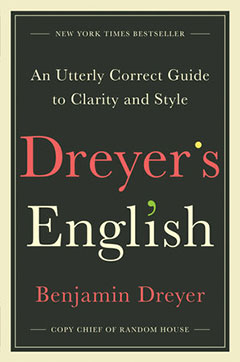 It would be the unusual writer who has not, at some time in their career, read, or turned to a style manual, or for that matter a guide to the English language. Strunk and White’s The Element of Style is one such classic. The Chicago Manual of Style, now in its 17th edition, is another go-to guide. My attention was recently caught by Dreyer’s English: An Utterly Correct Guide to Clarity and Style. By Benjamin Dreyer. He is the copy chief of Random House.
It would be the unusual writer who has not, at some time in their career, read, or turned to a style manual, or for that matter a guide to the English language. Strunk and White’s The Element of Style is one such classic. The Chicago Manual of Style, now in its 17th edition, is another go-to guide. My attention was recently caught by Dreyer’s English: An Utterly Correct Guide to Clarity and Style. By Benjamin Dreyer. He is the copy chief of Random House.
For those not entirely familiar with the publishing process, a copy editor is the person who, “after a piece of writing has been … through numerous drafts, developed and revised by the writer and by … the editor … [goes over the work] and makes it better. Cleaner. Clearer. More efficient.”
Such a person is not generally known by readers, although such people are vital to book making.
It is a myth that writers work alone. Many people, from my wife, to friends, editors, copy editors, have had useful things to say about what I write during the long journey to publication. Always. The point is, every book I have written (and it’s true for most published books) has undergone scrutiny and improvement by a copy editor. My experience is that these people are generally very smart, and their conscious knowledge of the language far exceeds my own. Over the years I’ve gotten to know some of them, become friends, collaborators, so that at certain publishers I request that they copy edit my books. Their corrections and suggestions always make my books better.
Which is why Dreyer’s English is so interesting and valuable. He is not setting down rules so much as he is showing how to bring (as per his subtitle) clarity to one’s work. Instance: In one of his earlier chapters he points out a number of words which are redundant, unnecessary, that clog up sentences. In one sense they are clichés. Or writing tics. Every writer has them.
In bed last night I read the chapter about these words. The first thing I did in the morning is open up a current project. I took the list and ran through my new manuscript (computers are great for this). Lo and behold (no surprise) there were those words—in excess—until I took them out. And, yes, it did enhance the clarity of my text. The point is, the reader won’t know what I did. But the reader will enjoy what I did. In other words Dreyer’s English is like having an early copy editor.
The essential point is that the writing can always be improved. It does not matter than I am such-and-such an age, that I have been writing for all these many years, or that I have published x number of books, and have won some recognition. I can get better. Every writer can. Why should you not want to be?
Read (and use) Dreyer’s English. You’ll be a better writer.
2 thoughts on “Writing with Clarity”
Thanks for the recommendation.
Thanks for this tip, Avi. Soon as I log off here, I’m going to go order a copy!